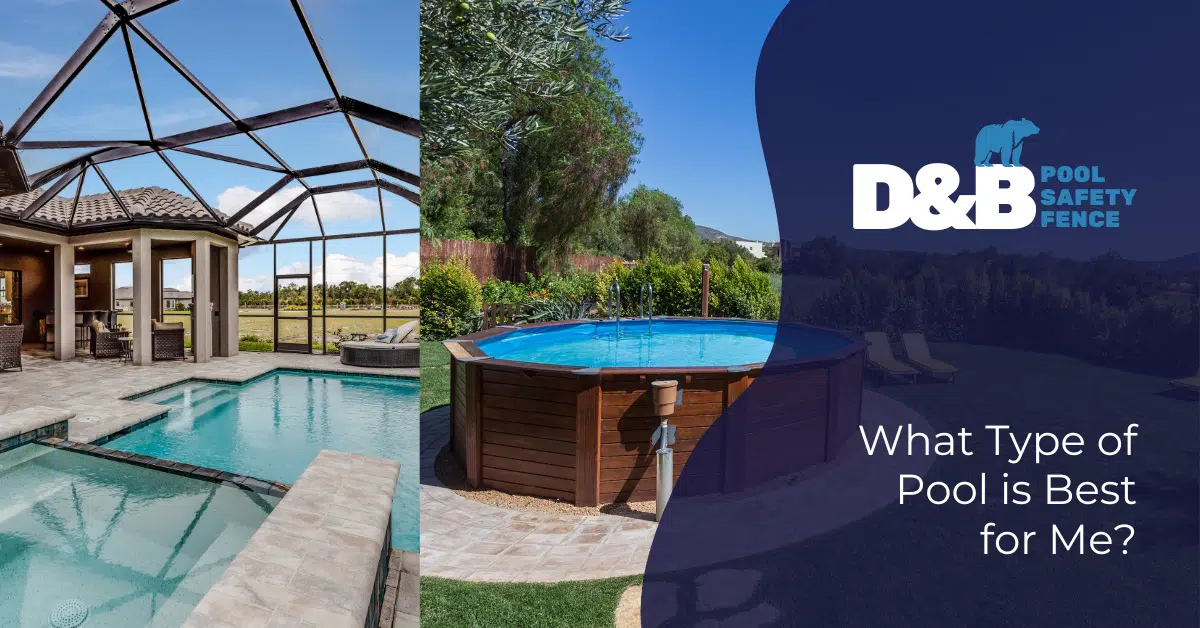Choosing the perfect pool for your home is an exciting journey filled with various considerations and decisions. It’s not just about picking a pool; it’s about creating a lifestyle, enhancing your home’s aesthetic, and ensuring endless fun and relaxation for years to come. However, the key to making a decision you’ll be happy with long-term lies in matching the pool type to your personal needs, the characteristics of your property, and your lifestyle.
Understanding Different Types of Pools
In-Ground Pools
In-ground pools are a popular choice for many homeowners due to their durability and the value they add to your property. They come in various materials, each with its own set of pros and cons.
Concrete Pools
Pros: Concrete pools are highly durable and offer endless customization options in terms of shape, size, and depth. They can be designed to fit any aesthetic, making them a versatile choice for those looking to make a statement with their pool.
Cons: The higher cost and longer installation time are significant considerations. Concrete pools also require more maintenance over time, which can add to the overall cost of ownership.
Fiberglass Pools
Pros: Fiberglass pools are easier to maintain and have quicker installation compared to concrete pools. Their smooth surface inhibits algae growth, reducing the amount of cleaning and chemicals required.
Cons: These pools come in pre-made shapes and sizes, which can limit customization. The initial cost can be high, although it may be offset by lower maintenance costs over time.
Vinyl Liner Pools
Pros: Vinyl liner pools are cost-effective and offer a wide range of customizable shapes and designs. They are a good option for those on a tighter budget who still want a personalized pool experience.
Cons: The liners are susceptible to punctures and require replacement every 5 to 9 years, which adds to the long-term cost. They also may not add as much value to your property as other in-ground options.
Above-Ground Pools
Above-ground pools are an excellent option for those looking for a more cost-effective and less permanent solution.
Pros: They are significantly cheaper than in-ground pools, can be installed quickly, and in some cases, moved to a new location if necessary. This type of pool is ideal for properties with challenging landscapes or for families who might not be ready to commit to an in-ground pool.
Cons: Above-ground pools are generally less durable and offer limited depth and size options. They may not integrate as seamlessly into your landscape design and can be seen as less aesthetically pleasing.
Factors to Consider When Choosing a Pool
Budget
Consider both the initial installation costs and the long-term maintenance expenses. In-ground pools are more expensive upfront but add value to your property. Above-ground pools are less costly initially but might not last as long.
Learn more about how a pool affects home value.
Property Size and Layout
The dimensions and shape of your yard will play a significant role in determining the best pool type. In-ground pools require significant space and access to construction equipment.
Aesthetic Preferences
Your pool should complement your home’s architecture and landscaping. Consider how the design and type of pool will fit into your overall aesthetic vision.
Maintenance and Upkeep
Evaluate how much time and resources you are willing to dedicate to pool maintenance. Fiberglass pools require the least maintenance, while concrete pools require the most.
Climate and Usage
Consider how weather conditions and seasonal use in your area might affect your pool choice. For example, fiberglass and vinyl liner pools may be better suited to areas with fluctuating temperatures due to their flexibility.
Special Considerations
Local Regulations and Permits
Be aware of local building codes and permits, as these can significantly impact your pool choice and design.
Long-Term Value
Think about how your pool choice might affect your property’s resale value. In-ground pools typically offer a better return on investment compared to above-ground options.
Making the Decision
Consultation with Professionals
Getting expert advice tailored to your specific situation is crucial. A professional can help you navigate the complexities of choosing the right pool, taking into account your personal preferences, budget, and property characteristics.
Evaluating Pros and Cons
Revisit the key points mentioned above and weigh them based on your personal priorities. Each pool type has its unique advantages and disadvantages, and the best choice depends on your specific needs and circumstances.
Conclusion
Choosing the right pool for your home is a significant decision that requires careful consideration. By understanding the different types of pools available and evaluating how each aligns with your personal needs, property characteristics, and lifestyle, you can make an informed decision that will bring you joy for years to come. Take the time to consult with professionals, consider all factors, and choose a pool that best fits your desires and needs. Your perfect pool awaits, promising endless days of relaxation and fun for you and your family.






